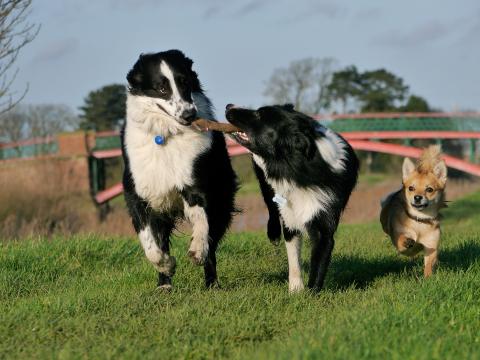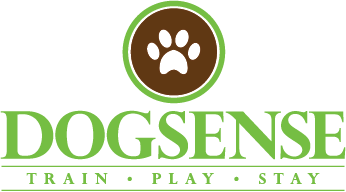
For safety, happy neighbors, and your dogs own health and happiness, it’s important to help your dog feel at ease in different social situations involving humans and animals. Dog Sense, a leading provider of dog boarding and dog training classes in Lancaster, offers some handy tips for how to help your dog develop the confidence and manners needed.
The Sooner the Better
Socialization training is most effective when a dog is 8 - 12 weeks old, but we recommend waiting until the puppy is at least 11 weeks old. This is the ideal time to begin exposing your pooch to the sights, sounds, and smells that comprise the world around him. Once your puppy has had its second set of puppy vaccinations around 12, take your dog into town, go on a nature walk, explore your neighborhood - anywhere with lots to see and smell. Bring treats with you to help reinforce good behavior and create positive associations, especially as it
pertains to your dog’s interaction with other dogs. The primary goal at this age should be confidence, learning to relax around sights and sounds, and to focus on their owner. We recommend using caution when allowing your puppy to interact with strangers or unknown dogs.
Breed Matters
Just as certain breeds may be especially suited for certain types of dog classes, so too are certain breeds more apt to be comfortable socially around new dogs and people. Some dog breeds are more easygoing and accepting, while other breeds may be less tolerant. For example, “aloof” breeds such as Chow Chows prefer their owners to strangers or other dogs. Terriers, are easily excitable and may not be able to handle social outings without training and preparation.
However, no breed should ever be considered a “lost cause”, and that’s where dog obedience training can play a pivotal role in helping your four-legged companion learn how to comfortably and positively be around people and other dogs, regardless of breed.
How Well Do You Know Your Dog?
Breed is important, but so too is your dog’s individual personality. If your dog is gregarious and friendly around you, your family, your friends, and even the postman, then chances are he’ll be a hit at the local dog park. However, if your dog is quiet, anxious, and overly aggressive, especially when out of his comfort zone, you might want to consider private training, behavior counseling, or classes at our dog training facility before he is ready fo walks around the neighborhood, or other social outings.
Body Language
Humans exhibit various forms of body language, and dogs do too. The more time you spend with you dog, the better you’ll be able to differentiate playful,calm or happy body language from body language that indicates anxiety or fear. When your dog is around other dogs, a soft gait and relaxed tail are a good signs. On the flipside, licking lips, lunging, barking, and excitability are signs that your dog isn’t ready for full interaction with other canines.
How Can Training and Obedience Classes Help?
Dog-to-dog interaction and etiquette are an integral part of the training and obedience classes at Dog Sense. Group training and group play constitute ideal learning environments in which your dog will learn how to interact with his “peers” in a positive way, stimulating his social development and minimizing anxiety.
Whether you’re interested in puppy training, certification classes, or a behavioral consultation, our experienced dog trainers can help. Contact us today and let’s discuss your specific needs.
